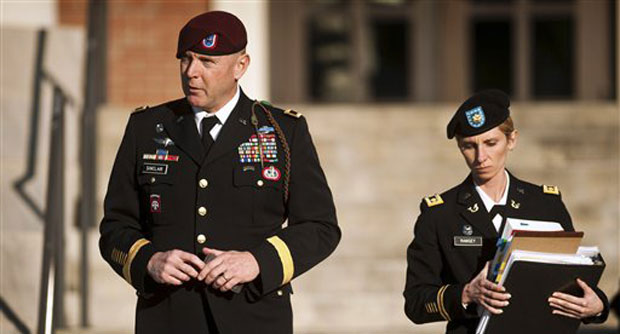
In this Tuesday, Jan. 22, 2012 file photo, Army Brig. Gen. Jeffrey A. Sinclair, left, leaves a Fort Bragg courthouse with a member of his defense team, Maj. Elizabeth Ramsey, after he deferred entering a plea at his arraignment on charges of fraud, forcible sodomy, coercion and inappropriate relationships. AP
FORT BRAGG, North Carolina—The former lead prosecutor in a sexual assault case against a United States Army general wanted most of the charges dropped after he became convinced the accuser had lied about crucial evidence.
That testimony came Tuesday at a hearing for Brigadier General Jeffrey A. Sinclair, who faces a court-martial on charges that include physically forcing a female captain under his command to perform oral sex.
Sinclair, once a rising star among the U.S. Army’s top battle commanders, is believed to be the most senior member of the U.S. military ever to face trial for sexual assault. It is extremely rare for such a high-ranking military officer to face a jury.
He is now fighting charges that could get him life in a military prison if convicted. His trial is set to begin this week.
Sinclair, 51, has pleaded not guilty to eight criminal charges including forcible sodomy, indecent acts, violating orders, and conduct unbecoming an officer and a gentleman.
Sinclair’s attorneys have asked a judge to dismiss the most serious of the charges against him, saying top officials at the Defense Department have unlawfully interfered with prosecutorial decisions in the case, but the judge refused Tuesday.
According to the testimony Tuesday, after former lead prosecutor Lieutenant Colonel William Helixon shared his concerns with his superiors, he was referred for a mental health evaluation and removed from the case.
Helixon was removed from the case last month after a superior officer, Brig. Gen. Paul Wilson, visited him in a Washington hotel room on Feb. 8.
Wilson testified that Helixon appeared drunk and suicidal. Wilson said Helixon didn’t want to pursue the case, but thought it was of strategic importance to the military’s crackdown on sexual assaults.
“He was in the midst of a personal crisis. He was crying. He was illogical,” Wilson said. Neither the defense nor prosecutors called Helixon to testify.
Lawyers for Sinclair, a married father of two have said he carried on a three-year extramarital affair with the junior officer during war tours in Iraq and Afghanistan. The admission of an affair will almost certainly end his Army career.
Prosecutors have described Sinclair as a sexual predator who abused his position of authority to prey on a subordinate trained to follow his orders. They also say he threatened to kill her and her family if she told anyone of their relationship.
The Associated Press does not publicly identify the alleged victims of sexual assaults.
Sinclair’s defense lawyers suggest the general is the victim, both of a jealous ex-lover and of overzealous prosecutors facing intense pressure from top military and political leaders to send a message that sexual misconduct will not be tolerated.
Helixon, the lead prosecutor, became convinced the accuser lied to him when she testified in January about evidence collected from her cellphone. Wilson testified Tuesday that Helixon was distraught that the accuser had lied to him.
“We’re in a remarkable place,” Richard Scheff, Sinclair’s lead defense lawyer, said this week. “The chief witness lied under oath. The lead prosecutor resigned because he found her untruthful and non-credible. The Army’s senior leaders agree with his assessment. And yet we’re going to trial.”
Prosecutors have declined to comment about the case outside court proceedings.
RELATED STORIES
Misconduct forces more US soldiers out
US general suspended over handling of sex assault case